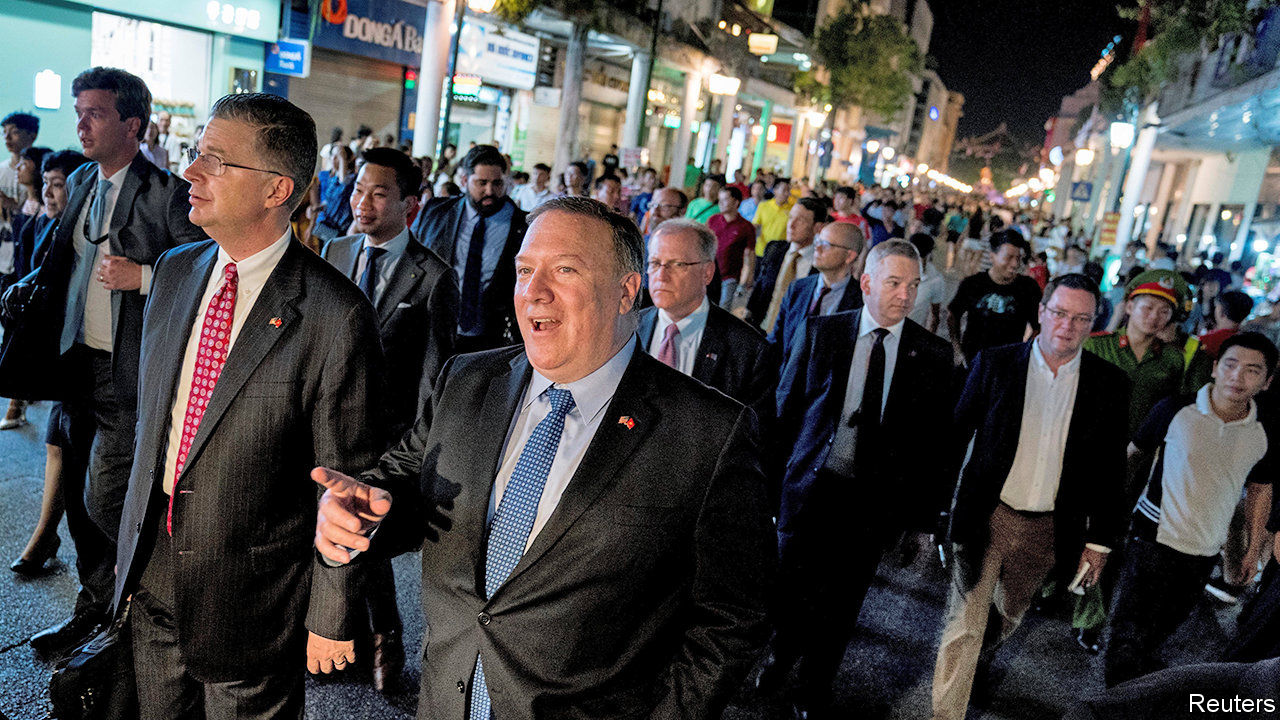Market reforms invite comparisons, but North Korea’s path is more fraught

AS AMERICA presses North Korea to abandon nuclear weapons, it has pointed to Vietnam as an example of the prosperity that awaits the isolated state. “It can be your miracle in North Korea as well,” Mike Pompeo (pictured), the secretary of state, said on July 8th, on a visit to Hanoi. It is not the first time Vietnam has been held up as a model for North Korea. Over the years, officials from the two countries have discussed lessons from Vietnam’s reforms. North Korea sees Vietnam as less threatening than China and more of a peer, making it a more welcome mentor. But North Korea’s economic path is likely to be more fraught.
Yes, there are similarities. Like North Korea’s economy today, Vietnam’s used to be largely collectivised. The Vietnamese Communist party’s ability to retain power at the same time as freeing markets must appeal to Kim Jong Un, North Korea’s dictator, who has vowed to improve his country’s economy. In 1985, on the eve of Vietnam’s doi moi liberalising reforms, its GDP per person was a mere 1% of America’s. In 2015 North Korea was in an identical position relative to America, according to UN figures (rough estimates, since North Korea publishes few statistics).
Diplomatically, the comparison also makes sense. Vietnam shows that a country can go quite quickly from being a sworn enemy of America to a close trading partner. Vietnam’s normalisation of relations came in 1995, just two decades after the two countries ended their war. America is now the biggest destination for Vietnamese exports. The shift could be faster for North Korea: its propagandists may have described America as its arch-enemy until recently, but it has been more than six decades since they fought.
Doi moi, meet juche
Nevertheless North Korea is different from Vietnam in three ways that could hurt. In Vietnam’s south, its economic heartland, collectivisation of farms and factories lasted just ten years before private ownership was restored. People who had previously run businesses were able to get quickly back in the game. After 65 years of juche, the national ideology of self-reliance, North Koreans are starting from scratch. The growth of informal food and goods markets in recent years shows some entrepreneurship, but the learning curve for big firms will be much steeper.
The structure of North Korea’s economy also complicates matters. More than 70% of the workforce in both Vietnam in the mid-1980s and China in the late 1970s (when its economic reforms started) was in agriculture. Simple changes to incentives—letting farmers profit from the sale of their own crops, for example—led to a surge of agricultural productivity. And the exodus of workers from farms generated a pool of cheap labour for factories, fuelling the rise of export industries.
By contrast, more than 60% of North Korea’s population already lives in cities. For big productivity gains, the government will need to overhaul moribund industries. In that respect North Korea resembles eastern Europe after the Soviet Union’s demise, says Marcus Noland of the Peterson Institute for International Economics, a think-tank in Washington. “There will be losers,” he says. Unemployment might soar. Privatisation could increase already-rampant corruption even further. Sitting between China, South Korea and Japan, North Korea should find it easy to attract capital to create jobs. But its record for foreign investors is poor: it seized South Korean assets at their showpiece joint industrial park in 2016 when relations deteriorated.
Another weakness for North Korea is demography. When Vietnam and China embarked on reforms they were both young countries, with median ages of about 20. They had many workers and few elderly dependent on them. In North Korea, the median age is already 34, making it even older than Vietnam today. As China ages, officials worry that it will get old before it gets rich. In North Korea the risk is that it will get old while it is still impoverished. All the more reason for Mr Kim to get cracking on economic reform. He may have little hope of building the next Vietnam. But better that he look to the outside world than keep North Korea entombed.
No comments:
Post a Comment
Note: Only a member of this blog may post a comment.